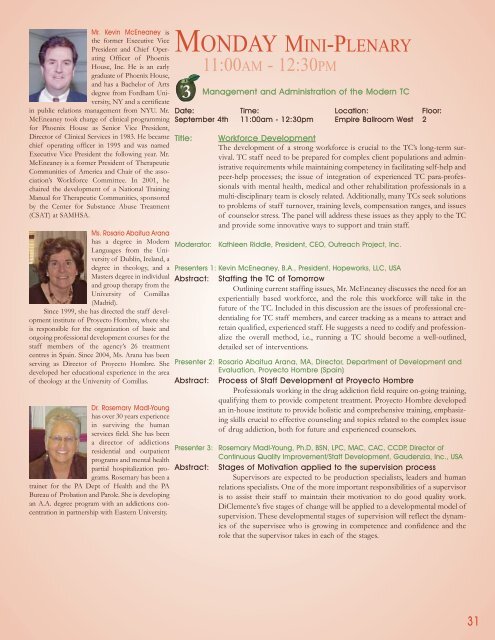East New York - World Federation of Therapeutic Communities ...
East New York - World Federation of Therapeutic Communities ...
East New York - World Federation of Therapeutic Communities ...
You also want an ePaper? Increase the reach of your titles
YUMPU automatically turns print PDFs into web optimized ePapers that Google loves.
Mr. Kevin McEneaney is<br />
the former Executive Vice<br />
President and Chief Operating<br />
Officer <strong>of</strong> Phoenix<br />
House, Inc. He is an early<br />
graduate <strong>of</strong> Phoenix House,<br />
and has a Bachelor <strong>of</strong> Arts<br />
degree from Fordham University,<br />
NY and a certificate<br />
in public relations management from NYU. Mr.<br />
McEneaney took charge <strong>of</strong> clinical programming<br />
for Phoenix House as Senior Vice President,<br />
Director <strong>of</strong> Clinical Services in 1983. He became<br />
chief operating <strong>of</strong>ficer in 1995 and was named<br />
Executive Vice President the following year. Mr.<br />
McEneaney is a former President <strong>of</strong> <strong>Therapeutic</strong><br />
<strong>Communities</strong> <strong>of</strong> America and Chair <strong>of</strong> the association’s<br />
Workforce Committee. In 2001, he<br />
chaired the development <strong>of</strong> a National Training<br />
Manual for <strong>Therapeutic</strong> <strong>Communities</strong>, sponsored<br />
by the Center for Substance Abuse Treatment<br />
(CSAT) at SAMHSA.<br />
Ms. Rosario Abaitua Arana<br />
has a degree in Modern<br />
Languages from the University<br />
<strong>of</strong> Dublín, Ireland, a<br />
degree in theology, and a<br />
Masters degree in individual<br />
and group therapy from the<br />
University <strong>of</strong> Comillas<br />
(Madrid).<br />
Since 1999, she has directed the staff development<br />
institute <strong>of</strong> Proyecto Hombre, where she<br />
is responsible for the organization <strong>of</strong> basic and<br />
ongoing pr<strong>of</strong>essional development courses for the<br />
staff members <strong>of</strong> the agency’s 26 treatment<br />
centres in Spain. Since 2004, Ms. Arana has been<br />
serving as Director <strong>of</strong> Proyecto Hombre. She<br />
developed her educational experience in the area<br />
<strong>of</strong> theology at the University <strong>of</strong> Comillas.<br />
Dr. Rosemary Madl-Young<br />
has over 30 years experience<br />
in surviving the human<br />
services field. She has been<br />
a director <strong>of</strong> addictions<br />
residential and outpatient<br />
programs and mental health<br />
partial hospitalization programs.<br />
Rosemary has been a<br />
trainer for the PA Dept <strong>of</strong> Health and the PA<br />
Bureau <strong>of</strong> Probation and Parole. She is developing<br />
an A.A. degree program with an addictions concentration<br />
in partnership with <strong>East</strong>ern University.<br />
MONDAY MINI-PLENARY<br />
11:00AM - 12:30PM<br />
Management and Administration <strong>of</strong> the Modern TC<br />
Date: Time: Location: Floor:<br />
September 4th 11:00am - 12:30pm Empire Ballroom West 2<br />
Title: Workforce Development<br />
The development <strong>of</strong> a strong workforce is crucial to the TC’s long-term survival.<br />
TC staff need to be prepared for complex client populations and administrative<br />
requirements while maintaining competency in facilitating self-help and<br />
peer-help processes; the issue <strong>of</strong> integration <strong>of</strong> experienced TC para-pr<strong>of</strong>essionals<br />
with mental health, medical and other rehabilitation pr<strong>of</strong>essionals in a<br />
multi-disciplinary team is closely related. Additionally, many TCs seek solutions<br />
to problems <strong>of</strong> staff turnover, training levels, compensation ranges, and issues<br />
<strong>of</strong> counselor stress. The panel will address these issues as they apply to the TC<br />
and provide some innovative ways to support and train staff.<br />
Moderator: Kathleen Riddle, President, CEO, Outreach Project, Inc.<br />
Presenters 1: Kevin McEneaney, B.A., President, Hopeworks, LLC, USA<br />
Abstract: Staffing the TC <strong>of</strong> Tomorrow<br />
Outlining current staffing issues, Mr. McEneaney discusses the need for an<br />
experientially based workforce, and the role this workforce will take in the<br />
future <strong>of</strong> the TC. Included in this discussion are the issues <strong>of</strong> pr<strong>of</strong>essional credentialing<br />
for TC staff members, and career tracking as a means to attract and<br />
retain qualified, experienced staff. He suggests a need to codify and pr<strong>of</strong>essionalize<br />
the overall method, i.e., running a TC should become a well-outlined,<br />
detailed set <strong>of</strong> interventions.<br />
Presenter 2: Rosario Abaitua Arana, MA, Director, Department <strong>of</strong> Development and<br />
Evaluation, Proyecto Hombre (Spain)<br />
Abstract: Process <strong>of</strong> Staff Development at Proyecto Hombre<br />
Pr<strong>of</strong>essionals working in the drug addiction field require on-going training,<br />
qualifying them to provide competent treatment. Proyecto Hombre developed<br />
an in-house institute to provide holistic and comprehensive training, emphasizing<br />
skills crucial to effective counseling and topics related to the complex issue<br />
<strong>of</strong> drug addiction, both for future and experienced counselors.<br />
Presenter 3: Rosemary Madl-Young, Ph.D, BSN, LPC, MAC, CAC, CCDP, Director <strong>of</strong><br />
Continuous Quality Improvement/Staff Development, Gaudenzia, Inc., USA<br />
Abstract: Stages <strong>of</strong> Motivation applied to the supervision process<br />
Supervisors are expected to be production specialists, leaders and human<br />
relations specialists. One <strong>of</strong> the more important responsibilities <strong>of</strong> a supervisor<br />
is to assist their staff to maintain their motivation to do good quality work.<br />
DiClemente’s five stages <strong>of</strong> change will be applied to a developmental model <strong>of</strong><br />
supervision. These developmental stages <strong>of</strong> supervision will reflect the dynamics<br />
<strong>of</strong> the supervisee who is growing in competence and confidence and the<br />
role that the supervisor takes in each <strong>of</strong> the stages.<br />
31


